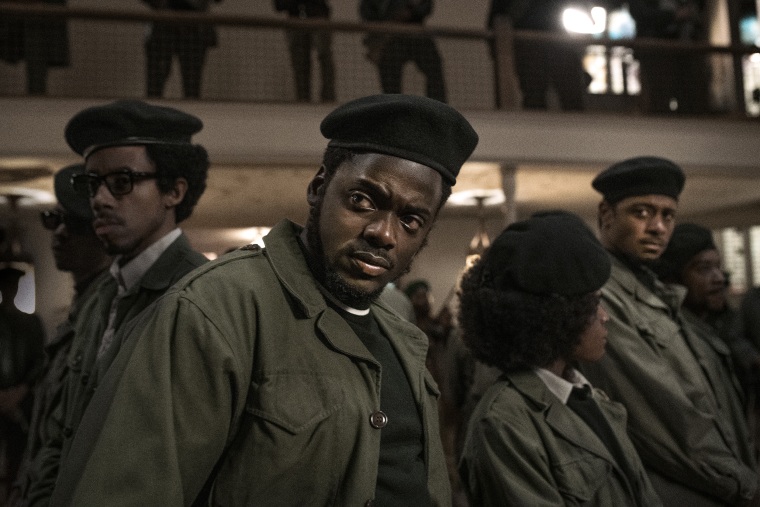Audiences seeing “Judas and the Black Messiah” likely already know what happened to Fred Hampton, a 21-year-old revolutionary and chairman of the Illinois Black Panther Party, when the film starts rolling: He was executed while sleeping in his bed during a police raid in the predawn hours of Dec. 4, 1969.
This outstanding film from director and writer Shaka King (co-written with Will Berson) — which opens Friday in theaters and streaming exclusively on HBO Max — examines moments, both intimate and communal, that led up to that tragedy through the lens of FBI informant William O’Neal. It draws its inspiration from the award-winning documentary, “Eyes on The Prize,” which includes the only on-camera interview with O’Neal.
The title is a direct nod to former FBI director J. Edgar Hoover’s proclamation to his agents that they “must prevent the rise of Black Messiahs” — and, in Hampton’s case, they did so by enlisting a Judas Iscariot, O’Neal, to betray him.
In his 1989 interview for “Eyes on The Prize,” O’Neal said “let history be the judge” of his actions during these tumultuous years. But even Judas himself couldn’t live with the weight of his actions.
The movie doesn’t absolve O’Neal for his part in the demise of Hampton, but it certainly humanizes him.
But “Judas and the Black Messiah” is more than a portrait of a little-known villain in the history of Black social movements; the movie as a whole is a portrait of an inflection point of a nation — 1969 — as we watch a “rat” get close to a would-be savior.
O’Neal (Lakeith Stanfield) got jammed up for impersonating a federal law officer in order to steal cars, and was recruited by Special Agent Roy Mitchell (Jesse Plemons) to become an FBI informant on the Black Panther Party in Chicago; specifically, he was to get close to Hampton (Daniel Kaluuya). It was part of the FBI’s notorious COINTELPRO program, as Hampton had captured the fevered attention of Hoover (Martin Sheen), who declared him “a threat to the national security to the United States.”
To that end, O’Neal insinuated himself into Hampton’s inner circle, then securing a Buick and shuttling him around Chicago to recruit folks into the party and reach out to area gangs. And, all the while, O’Neal was giving information back to Mitchell and the feds.
“Judas and The Black Messiah” doesn’t absolve O’Neal for his part in the demise of Hampton, but it certainly humanizes him. Stanfield walks a tricky line in rendering O’Neal as both seemingly willing to dedicate himself to the cause of Black liberation and a slippery felon who under the careful tutelage of Mitchell, seduced by his own material desires. O’Neal knows the game, even as in Mitchell tries to convince him to remain focused on the mission and ideological differences (or supposed lack thereof) between the Panthers and the Klan.
Even Judas himself couldn’t live with the weight of his betrayal.
In the wake of the assassination of Martin Luther King Jr. in the spring of 1968, anticommunism, fueled by racism and fears of miscegenation, becomes Hoover’s ministry — and the vacuum of leadership in the ongoing civil rights struggle motivated the FBI’s and the Chicago Police Department’s efforts to stop Hampton and the party.
King doesn’t sanitize these moments or glaze them with hagiography, and provides a fairly balanced portrayal of all these moving parts.
As a side note, too often in fictional depictions of the Black Panthers, women are relegated to props and margins, yet here the film presents them accurately as integral to movement and with agency in the operations of the organization. Judy Harmon (Dominque Horne) assesses O'Neal's bona fides after he is made as a car thief, and even interrogates him at gunpoint. And, in showing the romance between Hampton and Deborah Johnson (Dominique Fishback), Fishback brilliantly shows the strength and vulnerability of Johnson, who must try to contain all her feelings as she fully grasps that her beloved Hampton may not survive their unborn child’s lifetime and the weight of bringing a child into a "war zone.”
In 1969, Hampton became the 27th member of the Black Panther Party killed that year; he was not the last. And in the end, for O’Neal, his role as informant defined the rest of his life. There is perhaps no better actor than Stanfield to play the slippery, morally dubious and incredibly human O’Neal, whose only allegiance was to his own neck even as he was constantly exposed to a movement of people trying to raise up all Black people.
The facts around Hampton’s murder still stun and appall half a century later, and “Judas and the Black Messiah” is a gripping, panoramic drama and is all too resonant in the year after widespread street protests in support of the movement for Black Lives. Hampton died for a version of that movement; the people he was trying to uplift are still dying.
CORRECTION (Feb. 12, 2021, 4:56 p.m. ET): An earlier version of this article misspelled the name of the actor who portrays Will O'Neal. It is Lakeith Stanfield, not Stansfield.



